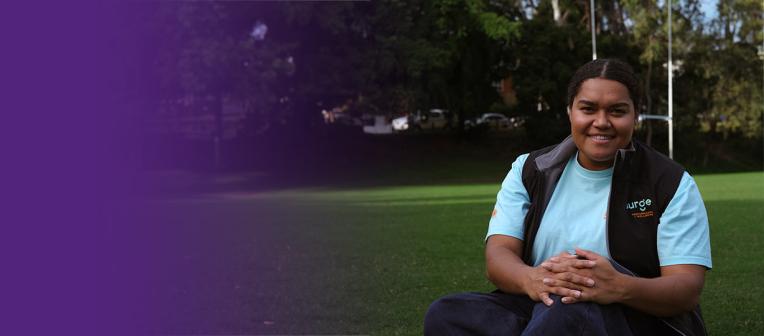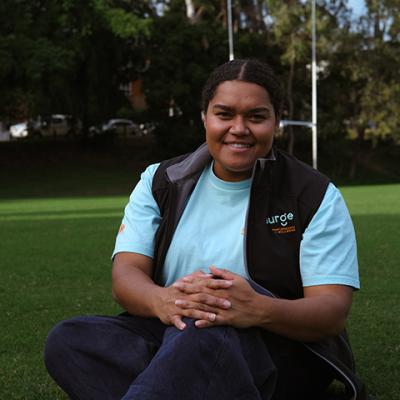Imagine a career where you get to help athletes soar to new heights – both physically and mentally. That's the world of sports psychology.
In Australia, where sport is a big part of life for many, sports psychologists play a crucial role. They team up with athletes to boost motivation, improve performance, and strengthen team bonds.
We recently spoke with Leilanie Pakoa and Tama Barry, graduates of the UQ Master of Psychology (Sport and Exercise Psychology) program, to learn more about their careers and explore what sports psychologists do. Leilanie focuses on guiding young athletes through challenges, while Tama excels in helping athletes reach their peak performance.
If you're intrigued by the human mind, passionate about sports, and love the idea of helping others succeed, this could be the career path for you.
What does a sports psychologist do?
Sports psychology is a specialised field within psychology that delves into how psychological factors influence athletic performance and engagement in sports. Sports psychologists are adept at understanding how an individual's thoughts, emotions and actions shape their athletic abilities.
You can think of a sports psychologist as a dedicated mental coach, always in your corner, offering support to maintain focus and overcome the mental hurdles that can emerge during games or competitions.
Sports psychologists can operate in a variety of capacities, including:
- teaching specialised mental techniques like visualisation and positive self-talk to improve athletes' performance
- helping athletes deal with unique pressures, like anxiety and motivation challenges, and mentally prepare for competitions
- understanding the social and personal factors impacting athletes, providing tailored support along their journey
- conducting sessions with individuals or teams, including performance consultations, workshops, and educational interventions
- supporting athletes in coping with the physical and emotional effects of injuries.
Leilanie works as a sports psychologist in 3 private practice clinics, where she helps clients of different ages and backgrounds, from children with diverse needs to individuals facing eating disorders.

In these clinics, Leilanie's main goal is to identify challenges and build skills to improve performance and wellbeing.
"I focus on finding problems and coming up with ways to make people perform better and feel better," she says.
"I love helping young people as they deal with the ups and downs of sports environments."
“I feel incredibly privileged that people choose to share their lives with me and that I love what I do every day.”
Where do sports psychologists work?
Sports psychologists play a vital role in enhancing athletic performance and promoting mental wellbeing in diverse settings. Whether collaborating with professional sports teams, providing individualised support in private practices, or contributing to national or international sports organisations, their impact is profound.
UQ graduate Tama is deeply immersed in high-performance sports through his roles at the Queensland Academy of Sport and in private practice.
At the Queensland Academy of Sport, he works closely with elite athletes, guiding them through daily performance routines, preparing them mentally for competitions, and providing support in clinical settings.
"My days involve consulting with athletes, meeting coaches, and attending training sessions," says Tama.
"Being part of their journey brings me immense fulfilment."
In private practice, Tama thrives in a supportive community, constantly innovating approaches to aid his clients.
"The blend of peer collaboration and formal supervision fuels my motivation," he says.
Beyond sports, sports psychologists extend their expertise to clinical environments, aiding athletes recovering from injuries or managing mental health challenges. They also work in medical centres, hospitals, and rehabilitation settings.
Their insights are also increasingly valued in non-athletic settings like the military and corporations, where their understanding of elite performance helps individuals and teams thrive under pressure.
Why choose a career in sports psychology?
Leilanie and Tama believe that sports psychology offers an exciting and diverse career path for those who love both psychology and sports.
"For me, it's all about helping people unlock their full potential," says Tama.
"Seeing individuals confidently embrace life's challenges is incredibly rewarding, and I feel privileged to be part of that journey."
Leilanie suggests that if you're ready for a career where every day brings new challenges and opportunities for growth, sports psychology might be the perfect fit for you.
"Throughout history, sport has broken down barriers and brought people together," she says.
"I want to be part of a profession that challenges the status quo and pushes boundaries to create positive change."
Benefits of a career in sports psychology
- Collaboration: Sports psychologists often work as part of a team, fostering a supportive and collaborative environment.
- Diverse opportunities: There are various career paths and specialisation options, including teaching, youth sports, and professional athletics training.
- Dynamic profession: Sports psychology offers a stimulating and dynamic career, where no 2 days are the same.
- Fulfilment: Few careers offer the level of satisfaction that comes from helping clients achieve their goals and thrive in their sports.
- Increasing demand: With the growing recognition of mental health in sports, there is a rising demand for qualified sports psychologists, providing ample job opportunities.
How much do sports psychologists make in Australia?
According to Glassdoor, the average sport psychologist salary is $97,000 in Australia. However, there are many factors that influence how much you can earn as a sports psychologist, including your years of experience, professional skills, and whether you work in a government role or in private practice.
Advice for future sports psychologists
Leilanie suggests that aspiring sports psychologists should approach their studies with an open mind.
"Be ready to be challenged, to question your beliefs, to receive feedback, and to embrace self-reflection," she says.
"These experiences will help you gain a deeper understanding of yourself and build confidence in working with diverse clients."
She also emphasises the importance of staying connected throughout the journey.
"Psychology can sometimes feel isolating, especially in private practice," she says.
"That's why it's crucial to build connections with supervisors, peers, colleagues, and other professionals."
"Don't forget to make time for your peers and nurture those connections."
Leilanie also highlights the patience required in pursuing this career path.
"Becoming a qualified psychologist is a long journey, and it may take longer than you expect; when I started my journey at UQ, I never imagined it would take me 9 years to achieve my goal of becoming a sport psychologist," she says.
"But let me tell you, it's worth every moment!"
How to become a sports psychologist
In Australia, becoming a registered sports psychologist typically involves completing an accredited 4-year psychology degree and a postgraduate degree in the specialist area of sports psychology.
At UQ, you have the opportunity to study undergraduate psychology through a:
- Bachelor of Psychological Science (Honours)
- Bachelor of Arts (psychology major)
- Bachelor of Science (psychology major).
From there, most aspiring sports psychologists pursue a Master of Psychology (Sport and Exercise Psychology) in order to gain professional registration as a sports psychologist. This program delves deeper into the theoretical and applied aspects of sports psychology, providing specialised training and supervised clinical experience.
Explore UQ's Master of Psychology (Sport and Exercise Psychology)







